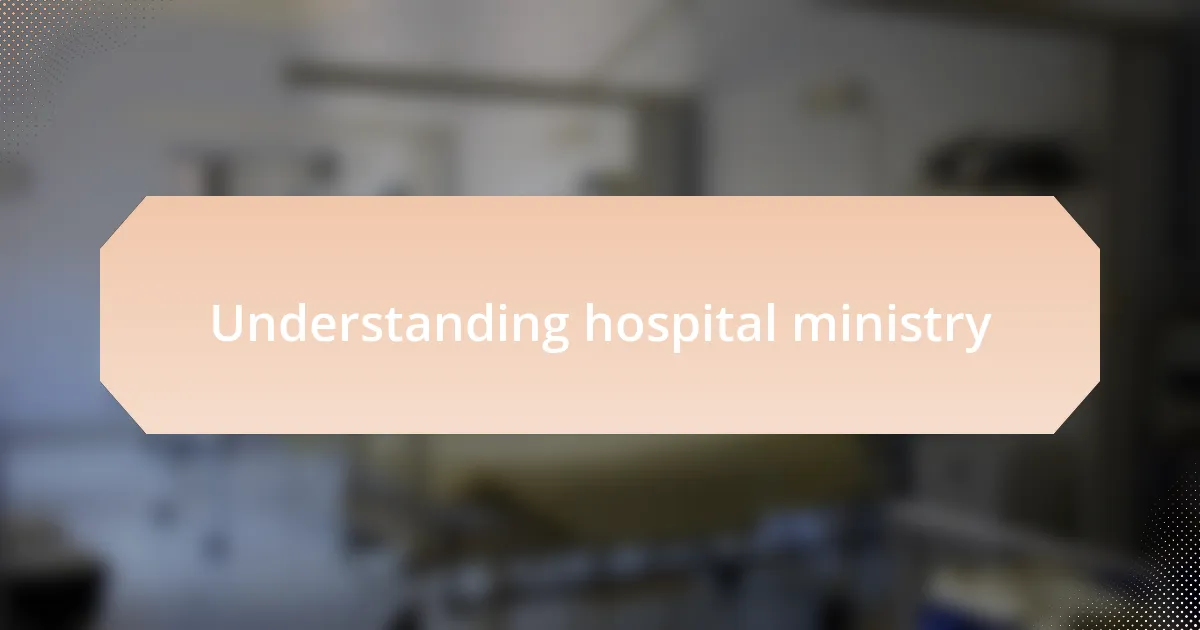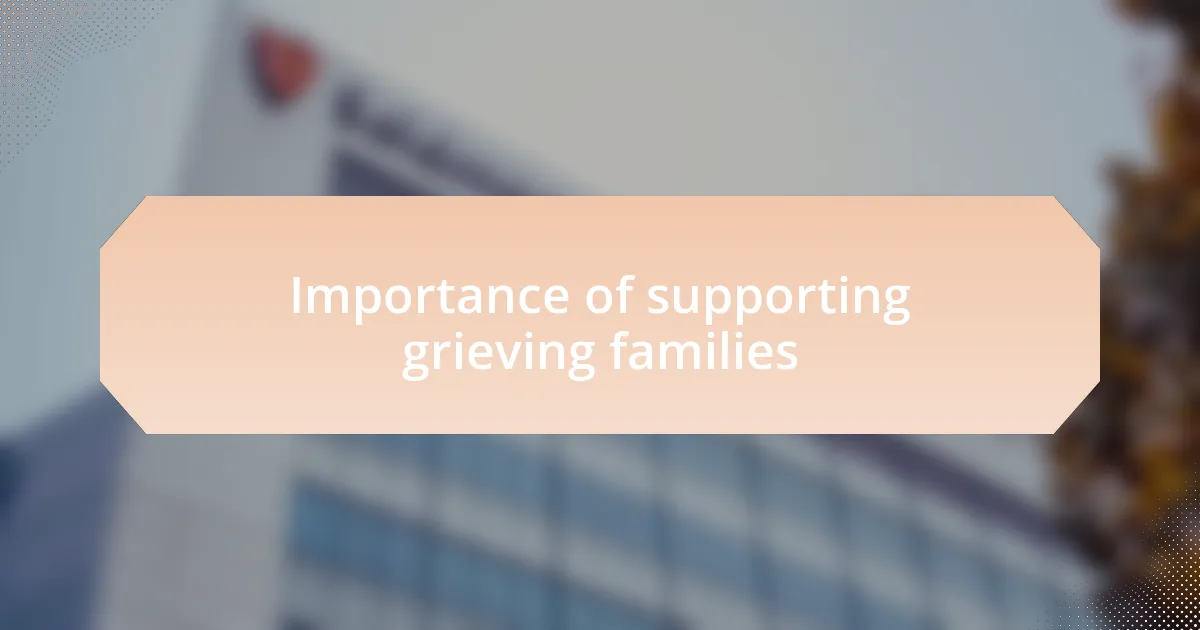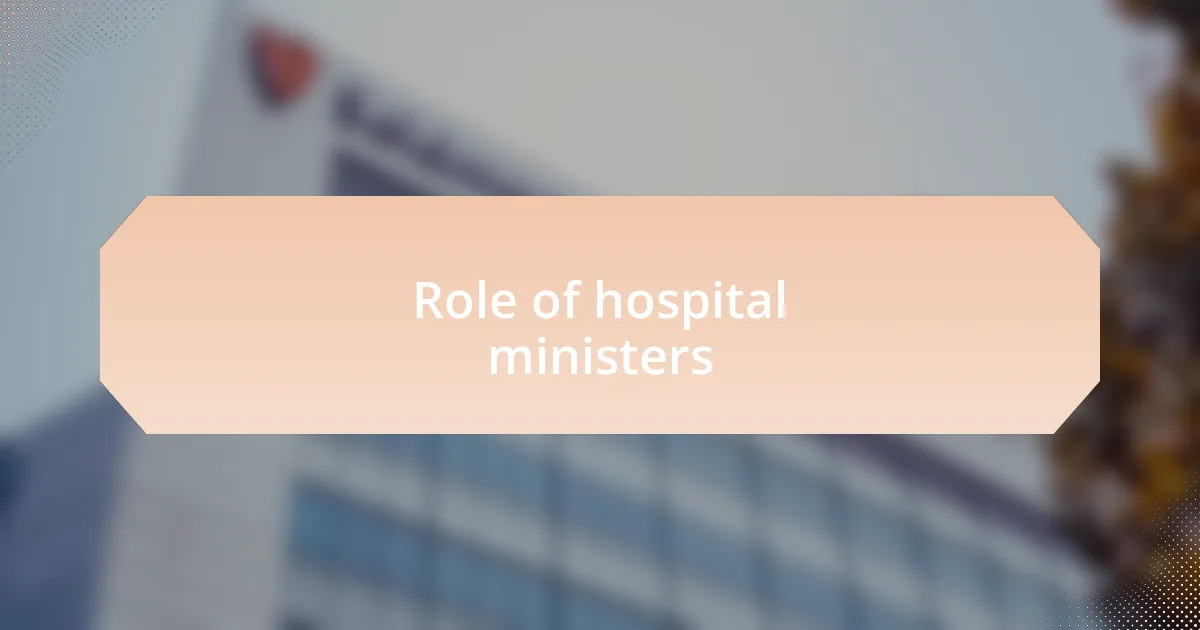Key takeaways:
- Hospital ministry emphasizes building genuine connections and providing comfort during challenging times through presence and compassionate gestures.
- Support for grieving families involves listening, sharing memories, and offering tangible help, fostering healing and community connection.
- Effective hospital ministers bridge communication between families and healthcare teams, creating rituals that honor the deceased and facilitate shared grief.
- Compassionate communication, including attentive body language and open-ended questions, can deepen emotional connections and provide solace to those in mourning.

Understanding hospital ministry
Hospital ministry is more than just a spiritual presence; it’s about forming genuine connections during some of life’s most challenging moments. I remember a time when I sat with a family whose loved one was in critical condition. They were overwhelmed with fear and uncertainty, and my simple act of listening seemed to provide a sliver of comfort amidst their distress. How often do we underestimate the power of simply being there for someone?
In these emotionally charged environments, hospital ministry serves as a bridge between the clinical and the spiritual. I often find myself reflecting on how a few kind words or a moment of prayer can transform a sterile hospital room into a space of hope. It’s remarkable to witness how faith can provide strength when everything else feels shaky. Have you ever felt that faith can create a palpable sense of peace, even in chaos?
Ultimately, hospital ministry is about meeting people where they are, both physically and emotionally. I recall a particularly poignant moment when I offered a small token, a prayer card, to a mother who had just lost her child. Her tearful gratitude reminded me of how even the simplest gestures of compassion can provide relief during profound heartache. In those moments, I realize that the true essence of hospital ministry lies in the ability to offer love, support, and understanding when it’s needed most.

Importance of supporting grieving families
Supporting grieving families is not just a duty; it’s a profound, compassionate engagement that can significantly alleviate their pain. I once stood beside a father who had just lost his teenage son. His anguish was palpable, and in that moment, my presence offered him a semblance of solace. Have you ever felt that sometimes simply sharing silence with someone can be more powerful than any words?
The importance of support in these moments cannot be overstated. I recall a bereaved mother expressing how a listening ear mattered more to her than any grand gestures. In the cramped hospital hallway, she shared stories of her son, and it struck me how sharing memories can serve as a healing balm. It made me think: when was the last time you felt truly heard in your grief?
Emotional stability becomes fragile in the aftermath of loss, and that’s why offering support can be life-changing. I’ve seen how simple acts—like offering a cup of coffee or a gentle touch on the shoulder—can help families navigate the uncharted territory of grief. It leaves me wondering: how often do we overlook the power of small kindnesses when they matter most? Each interaction becomes a thread of connection, weaving hope amidst heartbreak.

Role of hospital ministers
The role of hospital ministers is deeply rooted in providing spiritual and emotional support to families experiencing grief. I recall sitting with a young couple who had just heard the news of their baby’s passing. In that moment, my role transcended mere interaction; it became a sacred space where they could explore their emotions, share their pain, and seek comfort in their faith. Have you ever considered how a compassionate presence can transform an unbearable moment into a shared journey of healing?
Hospital ministers often act as liaisons between the medical teams and grieving families, ensuring that spiritual needs are addressed. During one particularly challenging night, I facilitated a meeting between a family and the healthcare team. This moment allowed the family to voice their concerns and questions regarding their loved one’s care. It made me realize that when families feel heard and supported, they often find a measure of peace even in the direst circumstances.
Additionally, I’ve witnessed how hospital ministers can create rituals that honor the life of the deceased, offering families a meaningful way to say goodbye. Once, I organized a small remembrance service in the hospital chapel where families could share memories and light candles. Seeing them come together in that intimate setting reminded me that grief can be a community experience. How often do we recognize the power of shared rituals in fostering connection and remembrance?

Practical ways to offer support
One practical way to support grieving families is by offering to listen without judgment. I remember one mother who simply needed someone to talk to about her feelings of guilt after losing her child. I sat with her, allowing her to share her story at her own pace. Have you ever noticed how the act of being truly heard can ease the weight of sorrow?
Another effective method is to provide tangible help, like preparing meals or running errands. During a particularly tough time, I coordinated a meal train within our community for a family who had just lost a parent. The overwhelming response not only lightened their load but also showed them they weren’t alone in their grief. It’s incredible how simple acts of kindness can create ripples of support in times of despair.
Lastly, exploring resources such as support groups can be invaluable. I vividly remember guiding a family to a local group where they met others who understood their pain. Watching them connect and share their experiences made me realize how crucial it is for grieving individuals to see they aren’t navigating this journey in isolation. Have you ever felt the comfort of shared understanding?

Tips for compassionate communication
Compassionate communication is essential when supporting grieving families. I once reached out to a widow during a particularly raw moment in her grief. As we spoke, I noticed the relief that washed over her when I validated her feelings, making space for her emotions without rushing her. Have you ever felt a sense of freedom simply from having someone acknowledge your pain?
It’s crucial to be mindful of your body language and tone when communicating. I remember kneeling down to speak with a grieving child at a memorial service, matching my posture to hers. This small adjustment helped her feel more comfortable sharing her feelings, illustrating that compassion isn’t just in words but also in how we physically connect. Wouldn’t it be amazing if everyone could experience that level of warmth and understanding?
Lastly, asking open-ended questions can be a lifeline for those in mourning. I often encourage families to share their favorite memories of their loved ones, which can spark healing conversations. I distinctly recall a session where a daughter shared a hilarious moment about her father, and laughter poured into the room, mingling with tears. How powerful it is to find joy amidst sorrow!

Creating a supportive environment
Creating a supportive environment begins with being present and attentive to the emotional space around grieving families. I vividly remember being in a waiting room filled with hushed whispers and heavy hearts. By simply offering a warm smile and sitting beside a grieving husband, I made it clear he wasn’t alone in that moment. Isn’t it incredible how non-verbal cues can communicate support just as profoundly as words?
Physical space can also play a role in creating a comforting atmosphere. I once arranged a small area in the hospital specifically for families to connect and share their stories. The soft lighting, comfortable seating, and calming decor invited them to engage with each other, creating an oasis of support. Have you ever noticed how a thoughtfully designed space can foster healing conversations and shared connections?
Moreover, actively encouraging families to engage in rituals can enhance their healing journey. I once organized a candle-lighting ceremony where family members could honor their loved ones while surrounded by a supportive community. The intimacy of that moment resonated deeply with all present, as each flickering flame symbolized cherished memories. Isn’t it heartening to think that such simple acts can empower families to navigate their grief together?

Personal experiences in hospital ministry
As I walked down the hospital corridors, I often encountered families clinging to each other, their faces a tapestry of hope and despair. One evening, I found myself in the chapel, where a mother quietly wept for her child. Without uttering a word, I simply sat beside her, allowing silence to fill the air. There’s something profoundly moving about being present in another’s pain; it’s as if we collectively share the weight of their sorrow.
One particular interaction stands out in my memory. I was speaking with a father who had just lost his daughter. He shared vivid memories of her laughter, and in that moment, I realized the importance of listening. I offered him a notepad, encouraging him to write down his favorite memories. It was a small gesture, but witnessing his relief as he poured his heart onto the page reminded me how cathartic it can be to voice our feelings, even when the words don’t come easily.
In moments of deep grief, I have seen that laughter can coexist with sorrow. I remember facilitating a support group where families shared funny anecdotes about their loved ones amidst tears. One woman recounted her husband’s shenanigans that always made her laugh, and soon everyone was smiling through their tears. How powerful is it to remember joy in the midst of grief? This blend of emotions can create a healing atmosphere, reminding families they are not alone in their journey.